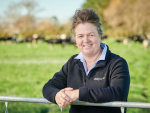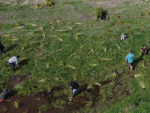Questions are being raised about just how good the state of the dairy industry is - especially given that the average farmgate payout for the coming season is set to exceed $10/kgMS.
Also, the fact that this past season has been a record one for export returns.
Andrew Laming, a director of NZAB, a financial advisory service specialising in farming, is one such person.
He says the $10 payout needs some context put around it. For a start, he agrees the NZ dairy industry is in good heart with an inflation adjusted payout for five years of about $9.20, which means that margins are above long-term averages. He also notes that debt levels in the sector are a bit lower, along with interest rates.
"The result is that you have got a lot of cash floating around in this business," he told Dairy News.
"Having said that, 15 years ago there was a lot more investment and expansion in farms but now we are seeing that money is being used to repay debt and also being used to do a bit of off-farm investment," he says.
While this all looks quite rosy, Laming says that people need to realise that the $10 payout is good but not great in comparison to past years. He says there were better payouts in 2013-14 that were much higher than the inflation-adjusted average at the time.
The same perspective is shared by DairyNZ's head of economics Mark Storey, who says while the breakeven forecast for the coming season is still positive, his analysis highlights notable annual increases in some key farm expenses. He says these are being driven by higher tax obligations, due to higher returns, and increases in general farm working expenses - particularly in feed, fertiliser, and energy costs.
"As a result, DairyNZ's forecast breakeven milk price has risen from $8.41/kgMS in the 2024-25 season to $8.68/kgMS in the 2025/26 season, which is a significant increase. We are predicting an average payout of $10.21/kgMS and average farm working expenses of $5.84/kgMS," he says.
Storey says despite the elevated costs, the outlook for the 2025/26 season remains positive, with robust milk price forecasts, and farmers likely to benefit from reduced debt levels and easing interest rates. He says these conditions should support continued debt reduction, reinvestment on-farm, and adjustments to personal drawings to manage inflationary pressures.
But at the same time, he cautions that the scale of cost increases over the past 12 months is concerning, and global volatility adds uncertainty to the months ahead.
Storey says fertiliser prices, for example, have increased sharply due to global supply constraints, export restrictions from China, and increased natural gas prices.
He says, compared to May last year, Phosphate prices are up 34% and urea 40%. He also notes that crude oil prices have also recently surged by 17% due to instability in the Middle East.
"Given New Zealand's reliance on imported fuel, dairy farmers should allow for potential cost spikes, especially during peak operational periods," he says.
DairyNZ chair Tracy Brown said the farmers she's been speaking with are following global events closely. She says with continued uncertainty in global markets and pressure on some key expenses, it's important farmers plan and build flexibility into their budgets where possible.


















